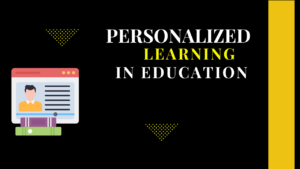
Introduction To Revolutionizing Education With The Power Of AI
Artificial Intelligence (AI) technology has become a disruptive force in various industries. Education is no exception. With its ability to process vast amounts of data, analyze patterns, and make intelligent decisions, AI has the potential to transform the way we teach and learn. In this article, “Revolutionizing Education With The Power Of AI“, we will explore the use of AI technology in education and delve into its benefits, challenges, and future possibilities.
Enhancing Personalized Learning
One of the significant advantages of AI in education is its ability to personalize learning experiences. AI-powered systems can adapt to individual students’ needs, pace, and learning styles, providing tailored content and feedback. By analyzing students’ performance data, AI algorithms can identify knowledge gaps and suggest appropriate resources or interventions. This individualized approach ensures that students receive the support they need to excel, fostering a more engaging and effective learning environment.

Improving Administrative Tasks
AI technology can streamline administrative tasks, allowing educators to focus on teaching. Automated grading systems can assess multiple-choice questions and provide immediate feedback, reducing the time spent on manual grading.
Also, AI algorithms can assist in managing student records, generating reports, and organizing schedules. This automation empowers educators to allocate more time to interact with students, develop innovative teaching strategies, and build stronger relationships.
Virtual Tutors and Intelligent Assistants
AI-powered virtual tutors and intelligent assistants have the potential to revolutionize the tutoring landscape. These systems can simulate one-on-one interactions, offering personalized guidance and support to students. Virtual tutors can adapt their teaching methods based on individual progress and provide real-time feedback.
Intelligent assistants, on the other hand, can answer students’ questions, provide explanations, and offer additional resources. By leveraging AI technology, students can access personalized help whenever they need it, enhancing their understanding and boosting their confidence.
Revolutionizing Education With The Power Of AI: Data-Driven Insights
AI technology can transform the way educators analyze and utilize data. By collecting and analyzing vast amounts of student data, AI algorithms can provide valuable insights into learning patterns, identifying areas of strength and weaknesses. This information enables educators to make data-driven decisions, refine teaching strategies, and optimize the learning experience.
Furthermore, AI-powered systems can predict student performance, allowing for early intervention and personalized interventions when necessary.
Challenges and Ethical Considerations
While the potential of AI technology in education is vast, it is essential to address the challenges and ethical considerations that arise. Privacy concerns, data security, and algorithm biases must be addressed to ensure the responsible use of AI in education. Educators and policymakers must work together to establish clear guidelines and regulations to protect student data and ensure transparency and fairness in AI systems.
The Future of AI in Education
As AI technology continues to advance, the possibilities for its use in education are limitless. Virtual reality (VR) and augmented reality (AR) can enhance immersive learning experiences, while natural language processing (NLP) can enable AI systems to understand and respond to students’ spoken language.
Additionally, AI technology can enable adaptive learning platforms that continuously evolve based on students’ progress and needs. The future of education holds immense promise. AI technology will play a pivotal role in shaping a more personalized, inclusive, and effective learning environment.
Conclusion Of Revolutionizing Education With The Power Of AI
Artificial Intelligence has the potential to revolutionize education by personalizing learning experiences, improving administrative tasks, providing virtual tutors and intelligent assistants, and offering data-driven insights. However, it is crucial to navigate the challenges and ethical considerations that arise. By harnessing the power of AI responsibly, educators can unlock new possibilities and create a future where every student can thrive and reach their full potential.






